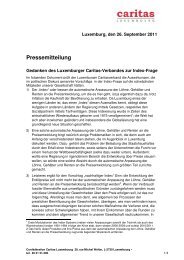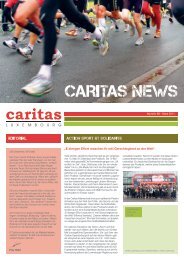Sozialalmanach - Caritas Luxembourg
Sozialalmanach - Caritas Luxembourg
Sozialalmanach - Caritas Luxembourg
Create successful ePaper yourself
Turn your PDF publications into a flip-book with our unique Google optimized e-Paper software.
Is it a crisis of morality?<br />
Moral condemnations were swift to follow. In the early days of the crisis, bankers and<br />
business executives were fiercely criticised, in terms of ‘greed’ and ‘irresponsibility’. If the<br />
system had failed, it was held to be greed and irresponsibility that had built the system,<br />
beyond either the power or the will of governments to control. At the World Economic<br />
Forum in Davos, in January 2009, Chinese Premier Wen Jiabao blamed the banks for<br />
their ‘blind pursuit of profit’ and ‘lack of self-discipline’, but also spoke of ‘the failure of<br />
financial supervision and regulation’. Evidently he referred primarily to the USA, since<br />
China had an estimated $1.95 trillion invested in dollar assets such as US Treasury Bonds. 3<br />
Wen Jiabao was not wrong. At the level of social morality and social psychology, it is<br />
hard to overlook the element of greed in the development of the crisis: that is, the search<br />
not only for reasonable profit as the legitimate reward of a company’s provision of goods<br />
and services, but for maximum profit. Old ‘common sense’ business maxims (e.g. that<br />
high profit margins are normally an indicator of high risk) were ignored in favour of a<br />
glorification of the rare skills of the fund managers who exploited the intricate possibilities<br />
of a system that only their ilk could identify. In the midst of this euphoria, to allow the<br />
financial sector’s profit margins to fall to ‘reasonable’ levels would count as entrepreneurial<br />
failure. 4 The trap was plausible because this form of ‘greed’ is part of capitalist culture, the<br />
signifiers of worth being precisely profit and growth. It may be remembered that greed as<br />
one of the classic ‘seven deadly sins’ is defined precisely by excess. The question cannot be<br />
evaded: can liberal capitalism accept the concept of excess?<br />
But fear (a demoralising form of consciousness that impedes both judgement and selfgiving,<br />
oddly not counted among the traditional seven deadly sins) also played its part. If<br />
greed drives the growth phase of an economic bubble, fear drives the overreaction. Under<br />
pressure of fear, a cycle of excessive growth is not reversed gently, by restraint or even by<br />
moderate austerity. Instead, the bubble ‘bursts’ – instantly seems to have been an illusion.<br />
The mass selling of shares in some company drives the price down so rapidly that it does<br />
not restore necessary equilibrium, but endangers the very existence of what had admittedly<br />
been overvalued. Pessimism is as contagious, as irrational, as optimism: both irrationalities<br />
project some current trend indefinitely, as if the trend were irreversible and determined.<br />
A variant on this kind of moral judgement is to say that the crisis has demonstrated a<br />
truth that we had hidden from ourselves for too long, because we have wanted to hide it. In<br />
other words, the moral failing is that of blindness, or what the theologian Bernard Lonergan<br />
calls ‘bias’: that block or distortion of intellect that derives from individual or group<br />
3 BBC, 29th January, 2009.<br />
4 On profit and the dangers of ‘short-termism’, cf. Benedikt XVI (2009), § 32.<br />
277








